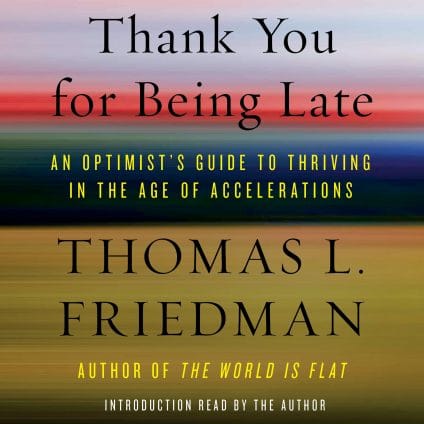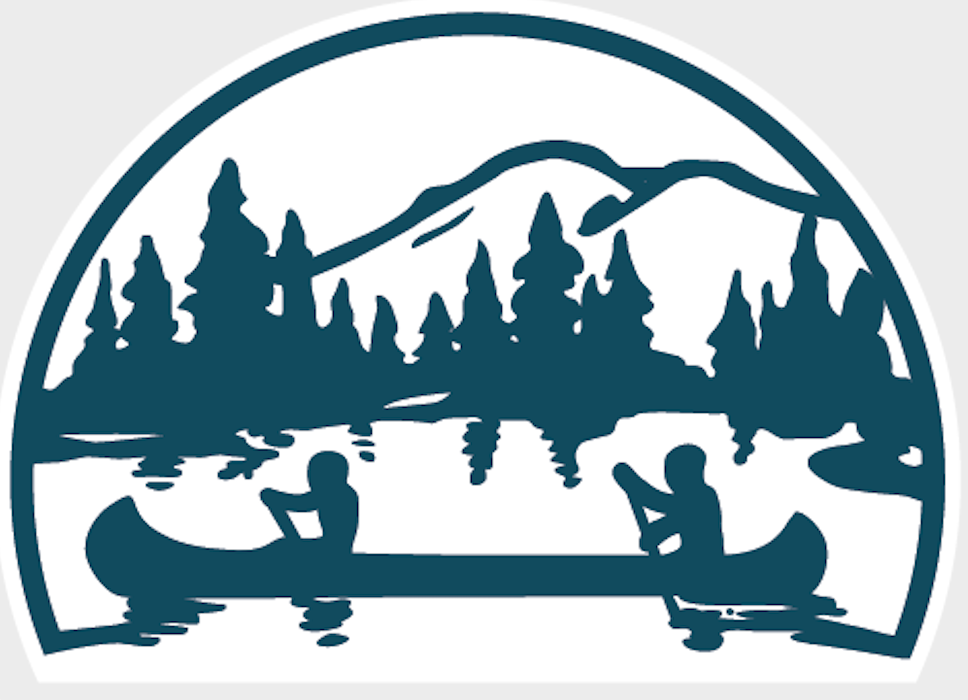 Thank You for Being Late by New York Times columnist Thomas Friedman a powerful book, and it does an outstanding job of explaining the current state of the world and the “accelerators” driving the insane pace of change. Friedman’s accelerators include Moore’s Law, Big Data, the markets, population growth, and global warming—all whose effects are expanding exponentially. At this point, the pace of change has exceeded most humans’ ability to adapt.
Thank You for Being Late by New York Times columnist Thomas Friedman a powerful book, and it does an outstanding job of explaining the current state of the world and the “accelerators” driving the insane pace of change. Friedman’s accelerators include Moore’s Law, Big Data, the markets, population growth, and global warming—all whose effects are expanding exponentially. At this point, the pace of change has exceeded most humans’ ability to adapt.
Throughout the book, Friedman points out suggestions to help one thrive in the years ahead. Without knowing it, he makes a compelling case for the Camp Pinnacle experience by emphasizing the importance of three of our most defining outcomes:
1. Time to reflect
By temporarily removing kids from their busy, tech-filled lives, Camp Pinnacle provides a natural environment where campers have the opportunity to be alone with their thoughts and reflect on their place in the world. “To whiz through our obligations without time for a single mindful breath has been a model for a successful life,” Friedman writes. But a pause is important; wisdom comes through reflection, and we are building a world that isn’t giving anyone the time to turn information into wisdom. “Not everything is better faster or meant to go faster.”
 A two- to three-week break, surrounded by friends at camp, is a unique opportunity to realize what is most important and help choose, how in our terms, we want to fit in with 21st-century life.
A two- to three-week break, surrounded by friends at camp, is a unique opportunity to realize what is most important and help choose, how in our terms, we want to fit in with 21st-century life.
2. The 4 C’s
Intelligence used to be defined by the breadth of what we knew. Now, with the advent of artificial intelligence, information is becoming a commodity—and intelligence is instead knowing what questions to ask. “Not only are we required to think both inside and outside of the box, but now we need to be prepared when there is no box at all,” writes Friedman. While technological skills are important to thrive in this accelerating and changing world, Friedman emphasizes the importance of “stempathy skills,” which include the ability to communicate, collaborate, empathize, flourish with uncertainty, and think creatively and critically. Friedman notes that the only occupations that have shown consistent wage growth since 2000 require not only cognitive skills, but, more important, strong social skills.
 Friedman implores educators to focus on the 4 C’s (communication, collaboration, creativity, and critical thinking—and to this he adds coding); these line up with what the research and advocacy by the Partnership for 21st-Century Skills. He emphasizes that these 4 C’s are not innate skills, but ones that can be taught. He warns that any skill without a strong human component will be replaced by computers or robots. We feel, and research from University of New Hampshire on our sister program Adventure Treks supports, that there are few better ways to improve one’s communication, collaboration, creativity, and pro social skills than a Camp Pinnacle outdoor experience.
Friedman implores educators to focus on the 4 C’s (communication, collaboration, creativity, and critical thinking—and to this he adds coding); these line up with what the research and advocacy by the Partnership for 21st-Century Skills. He emphasizes that these 4 C’s are not innate skills, but ones that can be taught. He warns that any skill without a strong human component will be replaced by computers or robots. We feel, and research from University of New Hampshire on our sister program Adventure Treks supports, that there are few better ways to improve one’s communication, collaboration, creativity, and pro social skills than a Camp Pinnacle outdoor experience.
4. The importance of community
In a technological world, we spend a lot of time in cyberspace where there are essentially no rules. There is a general feeling that the world is becoming less stable and that fewer people know the “rules” of living in society. If we want society to remain stable, Friedman emphasizes the importance of community, character, and values, and knowing how to live as a contributing member to one’s community. Anthropologically speaking, humans are meant to live in a community, and studies show that we are happier when we are connected to others. Relationships are the hallmark of the human experience, and they can only be nurtured with time. Our ability to forge human relationship is a unique human capacity and is what separates us from nature or machines.
 Friedman affirms that character is rarely an individual accomplishment; rather, it emerges through “joined hearts and souls and in a group.” Our focus at Camp Pinnacle is “cultivating the intense, thick community” that Friedman and David Brooks emphasize. Once campers have experienced the power and joy of a close community experience, they seek it out elsewhere and facilitate community in the groups they work and live in. A strong community experience provides important grounding in a constantly changing world.
Friedman affirms that character is rarely an individual accomplishment; rather, it emerges through “joined hearts and souls and in a group.” Our focus at Camp Pinnacle is “cultivating the intense, thick community” that Friedman and David Brooks emphasize. Once campers have experienced the power and joy of a close community experience, they seek it out elsewhere and facilitate community in the groups they work and live in. A strong community experience provides important grounding in a constantly changing world.
As the world becomes more technological, we feel a great way to build skills to thrive in this world is to actually take a break and spend time outside with friends at camp. And while our campers are having fun in the outdoors, they come home with a skill set that better prepares them to thrive in this new age of accelerators.
